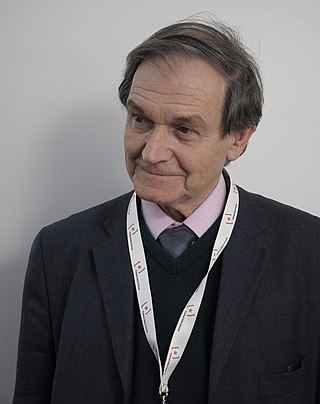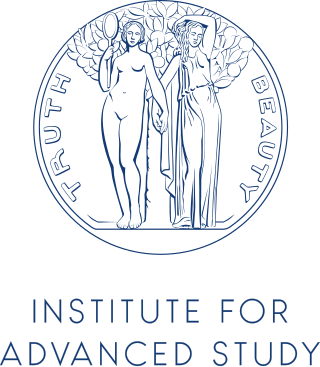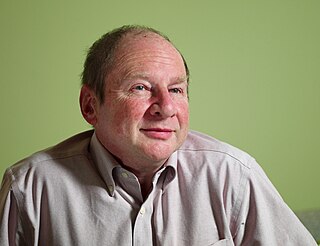
Brian Wilson Kernighan is a Canadian computer scientist. He worked at Bell Labs and contributed to the development of Unix alongside Unix creators Ken Thompson and Dennis Ritchie. Kernighan's name became widely known through co-authorship of the first book on the C programming language with Dennis Ritchie. Kernighan affirmed that he had no part in the design of the C language.

Donald Ervin Knuth is an American computer scientist and mathematician. He is a professor emeritus at Stanford University. He is the 1974 recipient of the ACM Turing Award, informally considered the Nobel Prize of computer science. Knuth has been called the "father of the analysis of algorithms".

Sir Roger Penrose, is a British mathematician, mathematical physicist, philosopher of science and Nobel Laureate in Physics. He is Emeritus Rouse Ball Professor of Mathematics in the University of Oxford, an emeritus fellow of Wadham College, Oxford, and an honorary fellow of St John's College, Cambridge, and University College London.

Stephen Wolfram is a British-American computer scientist, physicist, and businessman. He is known for his work in computer algebra, and theoretical physics. In 2012, he was named a fellow of the American Mathematical Society.
The technological singularity—or simply the singularity—is a hypothetical future point in time at which technological growth becomes uncontrollable and irreversible, resulting in unforeseeable consequences for human civilization. According to the most popular version of the singularity hypothesis, I. J. Good's intelligence explosion model of 1965, an upgradable intelligent agent could eventually enter a positive feedback loop of self-improvement cycles, each new and more intelligent generation appearing more and more rapidly, causing a rapid increase ("explosion") in intelligence which would ultimately result in a powerful superintelligence, qualitatively far surpassing all human intelligence.

Alfred Vaino Aho is a Canadian computer scientist best known for his work on programming languages, compilers, and related algorithms, and his textbooks on the art and science of computer programming.

The Institute for Advanced Study (IAS) is an independent center for theoretical research and intellectual inquiry located in Princeton, New Jersey. It has served as the academic home of internationally preeminent scholars, including Albert Einstein, J. Robert Oppenheimer, Hermann Weyl, John von Neumann, and Kurt Gödel, many of whom had emigrated from Europe to the United States.

Generative art is post-conceptual art that has been created with the use of an autonomous system. An autonomous system in this context is generally one that is non-human and can independently determine features of an artwork that would otherwise require decisions made directly by the artist. In some cases the human creator may claim that the generative system represents their own artistic idea, and in others that the system takes on the role of the creator.

John Edward Hopcroft is an American theoretical computer scientist. His textbooks on theory of computation and data structures are regarded as standards in their fields. He is a professor emeritus at Cornell University, co-director of the Center on Frontiers of Computing Studies at Peking University, and the director of the John Hopcroft Center for Computer Science at Shanghai Jiao Tong University.

John McCarthy was an American computer scientist and cognitive scientist. He was one of the founders of the discipline of artificial intelligence. He co-authored the document that coined the term "artificial intelligence" (AI), developed the programming language family Lisp, significantly influenced the design of the language ALGOL, popularized time-sharing, and invented garbage collection.

Harold Abelson is an American mathematician and computer scientist. He is a professor of computer science and engineering in the Department of Electrical Engineering and Computer Science at the Massachusetts Institute of Technology (MIT), a founding director of both Creative Commons and the Free Software Foundation, creator of the MIT App Inventor platform, and co-author of the widely-used textbook Structure and Interpretation of Computer Programs, sometimes also referred to as "the wizard book."

Maximum PC, formerly known as boot, is an American magazine and website published by Future US. It focuses on cutting-edge PC hardware, with an emphasis on product reviews, step-by-step tutorials, and in-depth technical briefs. Component coverage areas include CPUs, motherboards, core-logic chipsets, memory, videocards, mechanical hard drives, solid-state drives, optical drives, cases, component cooling, and anything else to do with recent tech news. Additional hardware coverage is directed at smartphones, tablet computers, cameras and other consumer electronic devices that interface with consumer PCs. Software coverage focuses on games, anti-virus suites, content-editing programs, and other consumer-level applications.

The MacBook Air is a line of laptop computers developed and manufactured by Apple since 2008. It features a thin, light structure in a machined aluminum case and currently either a 13-inch or 15-inch screen. The MacBook Air's lower prices relative to the larger, higher performance MacBook Pro have made it Apple's entry-level notebook since the discontinuation of the original MacBook line in 2011.

The Mac, short for Macintosh, is a family of personal computers designed and marketed by Apple. The name Macintosh is a reference to a type of apple called McIntosh. The product lineup includes the MacBook Air and MacBook Pro laptops, and the iMac, Mac Mini, Mac Studio, and Mac Pro desktops. Macs are sold with the macOS operating system.
Hyunjune Sebastian Seung is President at Samsung Electronics & Head of Samsung Research and Anthony B. Evnin Professor in the Princeton Neuroscience Institute and Department of Computer Science. Seung has done influential research in both computer science and neuroscience. He has helped pioneer the new field of connectomics, "developing new computational technologies for mapping the connections between neurons," and has been described as the cartographer of the brain.

The iMac is a series of all-in-one computers from Apple Inc. operating on the MacOS. Introduced by Steve Jobs in August 1998 when the company was financially troubled, the computer was an inexpensive, consumer-oriented computer that would easily connect to the Internet. Since that time, it has remained a primary part of Apple's consumer desktop offerings and evolved through seven distinct forms.

Cynthia Dwork is an American computer scientist best known for her contributions to cryptography, distributed computing, and algorithmic fairness. She is one of the inventors of differential privacy and proof-of-work.

Fei-Fei Li is a Chinese and American computer scientist, known for establishing ImageNet, the dataset that enabled rapid advances in computer vision in the 2010s. She is the Sequoia Capital professor of computer science at Stanford University and former board director at Twitter. Li is a co-director of the Stanford Institute for Human-Centered Artificial Intelligence and a co-director of the Stanford Vision and Learning Lab. She served as the director of the Stanford Artificial Intelligence Laboratory from 2013 to 2018.
Thomas L. Griffiths is an Australian academic who is the Henry R. Luce Professor of Information Technology, Consciousness, and Culture at Princeton University. He studies human decision-making and its connection to problem-solving methods in computation. His book with Brian Christian, Algorithms to Live By: The Computer Science of Human Decisions, was named one of the "Best Books of 2016" by MIT Technology Review.

The Intel-based MacBook Pro is a discontinued line of Macintosh notebook computers sold by Apple Inc. from 2006 to 2021. It was the higher-end model of the MacBook family, sitting above the consumer-focused MacBook Air, and was sold with 13-inch to 17-inch screens.
















